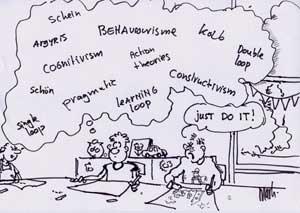 As I said in an earlier blogpost, Mr. Boateng who is a board member of GAPVOD, the NGO umbrella organisation of Ghana, gave an excellent and inspiring talk about networks in Ghana. Though not all networks in Ghana have learning at their core, as communities of practice have, I think it is interesting to explore where these dynamics stimulate or inhibit communities of practice within networks. Hence a summary of what he discussed (any reformulations may be mine):
As I said in an earlier blogpost, Mr. Boateng who is a board member of GAPVOD, the NGO umbrella organisation of Ghana, gave an excellent and inspiring talk about networks in Ghana. Though not all networks in Ghana have learning at their core, as communities of practice have, I think it is interesting to explore where these dynamics stimulate or inhibit communities of practice within networks. Hence a summary of what he discussed (any reformulations may be mine):o There are ad hoc and institutionalised networks, the latter help members to do their work in a more competent way. Ad hoc networks come together and dissolve after the work is done.
o In Ghana lots of networks compete with their members for project implementation as they start to do projects, rather than helping member to do their work eg. GINKS should not educate people on ICT4D, but rather help members to do so.
o Networks are expected to engage in advocacy to remove bottlenecks impeding member’s activities, create a conducive environment. Members need capacity to advocate. A network is credible in its advocacy attempt when it not only shows what’s going wrong, but also ways of moving forward. If a network criticises too much, it get a troublesome name and will be seen as ‘opposition’ hence closing the ears of people who should listen.
o For funding you can also look into the network. Members can put something on the table as well. Combine strengths to provide the necessary materials for the work.
o It is important to have strong people to be part of your network. The strength of a network is in its members. Executives don’t have to be everywhere, an executive doesn’t have to move to Tamale to do a project, while a member is there.
o Commitment and dues: if executives have to use their own money to travel it is demotivating, while there are members who can work. Dues are very important to sustain the work, either annual or monthly dues. Donors come to support what you are already doing, but most networks are donor-driven. “No representation without taxation, no taxation without representation”, dues also create commitment.
o Leadership, leaders who become employees of the network is a threat to the network. While choosing leaders, it is important to check the background of these leaders and monitor. Audit reports should be presented to the general assembly meeting.
o Local networks must appreciate that they are local and base decisions on its functioning on that. For instance, while choosing an office, how do you sustain the office rent? Development partners will not always help us.
o Information should flow, not only between the coordinator and the secretary. An audit report should be presented to all, so that people know about it.
o Look at your allies and supporters. Eg. the village chief. The chief has to give his support to get to work in the communities, this is something you have to respect.
o Network challenges are funding and fundraising, proposal writing, and making use of local assets. Everybody has limited resources, so be the link with others in the community. You need strong people to take the network off.
o Institutional structure. Talked about members and blocking information for the members, so that people are voted back in office. The constitution should not be manipulated. If people don’t understand things, you have to repackage it so that they can understand.
o It is important for network to identify the strength of its members. Eg. can use SMS to get quick feedback on issues. Have the right people managing the right positions, and partner with the media as important allies. Try to weave your way into the political leadership. ‘Who can I use? Where is he going to church?’ And tell them about alternatives. When presenting something, think about ‘what’s in it for me’ while packaging your advocacy message.








